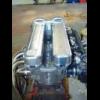
Electrics For A Beginner...
#1

Posted 01 November 2015 - 09:45 AM
My next project is to tidy up the wiring loom.
Whilst I could buy a new one, I thought I'd take the opportunity to a) learn about electrics, and b) make some improvements (e.g. headlights).
Now, I've no knowledge of anything electrical and haven't even used a multimeter so it's going to be interesting. The electrics FAQ's on here has a huge amount of incredibly useful info but, does anyone know of any resources for the complete novice? I guess I'm looking for a book of some sorts to go through before I take the plunge and start buying tools etc...
Thanks in advance.
#2

Posted 01 November 2015 - 10:09 AM
I have a few at my place of work, who happily take 5 minutes out of their busy schedule to show me various wiring tips, wiring ratings, multimeter use's, advice on helpful tools to buy and have even bulk ordered connectors for me.
If your not as lucky to have a bunch of helpful electricians, Maplins do a book on starting in electronics, which goes through the basic principles. They will probably have other books for sale, which maybe better suited to auto electrics
HTH
#3

Posted 01 November 2015 - 10:21 AM
Starter electrics course here in the FAQs electrical section, covers all the basics
#4

Posted 01 November 2015 - 10:32 AM
if you look here http://www.carbuildersolutions.com/uk/ am sure there are wiring diagrams/guides that run you through wiring a car up. gives wire sizes, colours, fuse and relay details as well.
it's also worth getting yourself a power probe as they are worth their weight in gold when you are dealing with wiring/electrical.
#5

Posted 01 November 2015 - 11:43 AM
A good multimeter is an essential tool in your armoury. Using one properly will tell you so much about the condition of your connections. IMO one of the most important tools.If you can follow a wiring diagram it makes life a lot easier than guessing.
#6

Posted 01 November 2015 - 11:46 AM
This ...
http://electronicsclub.info/menu.htm
... Is a good website designed for school kids. And to be honest, if you can get to grips with the basics, there's not much in a Mini that's complicated.
(Opinion based on having a degree in electronics, and forgotten a lot of it.)
#7

Posted 01 November 2015 - 01:50 PM
Minitrio - unfortunately not in the right industry to have an electrician on hand. I'll take a look in Maplins.
KernowCooper - I see you've spent a lot of time compiling the FAQ's so thanks in advance.
Anon / David128 - thanks for the tips on tools.
Fenghuang - I'm ashamed to say as basic as purely knowing how to change a fuse. I'll start with your 'electrics for kids' site and go from there.
Once again, thanks for the help!
#8

Posted 02 November 2015 - 11:04 AM
Get a digital meter as, for the novice, they're actually easier to read than those with analogue needle type displays, because they only show one scale at a time.
If you get one with test leads that aren't permanently plugged in, the red one goes in the red socket, and the black one ... guess what! (There may be more than two sockets: if in doubt, post a pic and ask.)
For most tests it won't actually make a great deal if difference which test lead you use on either end of whatever your testing. (And in terms of function, there's no difference between the red and black lead - they're just colour coded to help.) You're only likely to want to know about voltages, resistance and continuity to start with. Of those only voltage has + and - and if you swap the test leads round that'll swap.
You will be able to select voltage range and whether it's AC or DC. You're not likely to need to test much other than up to 15v so there may be a settings that say 10v or 100v. Choose the lowest one that is larger than 15v. There will be two of these: one will say AC or have a wiggly line by it, the other will be DC or have a straight line (or a straight line with dots above it, or something like that). You're unlikelyvto need AC, so you'll probably need something like 20v DC.
If you're testing wires, most people will use the "continuity" test on a multimeter. It may have a logo fir a diode (look it up) or something that looks like a speaker symbol (again look it up) or curved lines that look like a bank card contact less payment symbol (which it isn't), or something else. It's basically a way to check if electricity can flow from one place to another, and if it can the meter will usually beep.
For me, testing resistance is better. For the length of cables in a mini, they shouldn't usually have a resistance of more than 2 or 3 ohms. In most cases, if part of your wiring is more than that, say 10 or 20 ohms, you're probably testing the wire and another component, or you've got something like a corroded terminal, damaged wire, loose connection etc. A continuity test won't tell you if that's the case.
To measure resistance, your meter may also have different ranges (up to 10 ohms, up to 1000 ohms (also written as 1k) up to 1000000 ohms (also written as 1M)) so you need to get your head round those values and pick the smallest range you can that will give meaningful results.
Continuity is useful for testing fuses. Pull the fuse out, put a test lead to each end of it, and if the meter beeps the fuse is ok.
Taking the fuse out is important, otherwise you could be testing what is connected to the fuse.
Hope that gets you started and doesn't repeat too much of Kernow's FAQ. (Which I haven't read.)
#9

Posted 02 November 2015 - 11:56 AM
As I trained as a Mechanical & Aeronautical engineer I used to absolutely hate electrical work and considered it a 'black art'.
However, it is very logical with the 12 volt DC system used in a Mini and most other classic cars. Get a multi-meter and a circuit diagram and you have the necessary basics.
If there is a problem start at the initial power supply and, with your multi-meter set to the 20 volt DC scale, check for connectivity at each stage of the circuit in question. For example, if the wipers fail, check from the supply to the fuse box 'power in' terminal, then the fuse 'power out' terminal. If there is power one side but not the other, then it is either a failed fuse of corroded fuse connection points. If that's all OK, move onto the wiper switch to check power in and power out (with the switch 'on'). If that's OK move onto the wiper motor power in terminal. If there is 12 volt power with the wiper switch 'on', then check the earth for the motor. If there is no power going to earth, there is a problem inside the motor.
Just follow the logic of the circuit diagram.
When wiring new stuff, try to keep the colour codes correct. the British Standard is BS-AU7 (available on-line), although we have all used different wiring colours for certain extras as keeping every required colour wire is not really practical. I'm just wiring in a pair of spotlights on my Land-Rover and I've used a non-standard colour for the feed from the relay to the lights. But always make sure the earth wires are black.
I buy my electrical stuff from AES Ltd, but there are many on-line suppliers.
Edited by Cooperman, 02 November 2015 - 11:59 AM.
#10

Posted 03 November 2015 - 07:23 PM
Thanks all
1 user(s) are reading this topic
0 members, 1 guests, 0 anonymous users



















